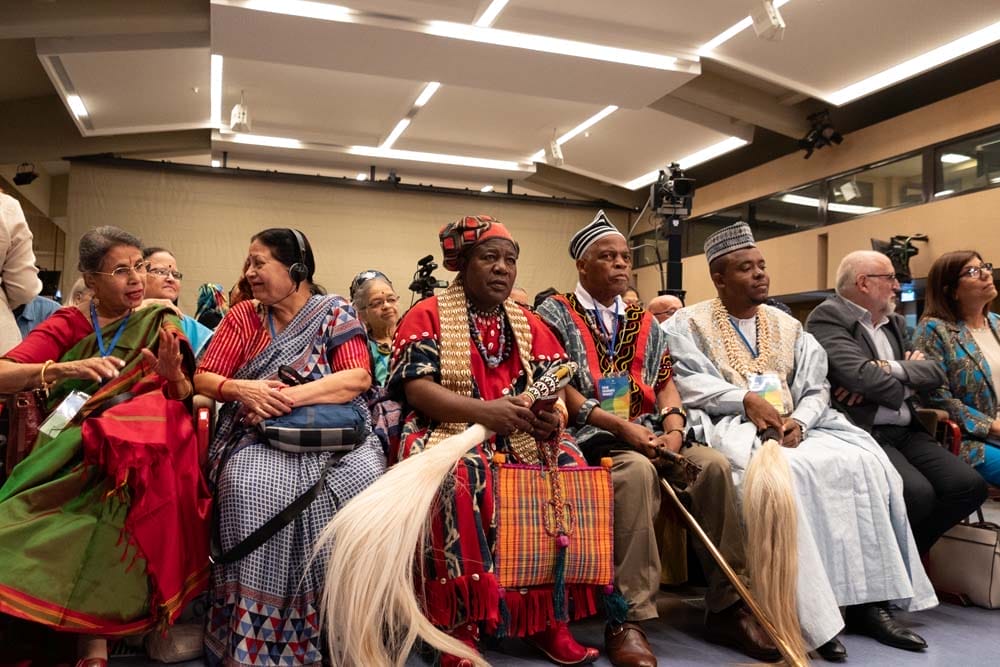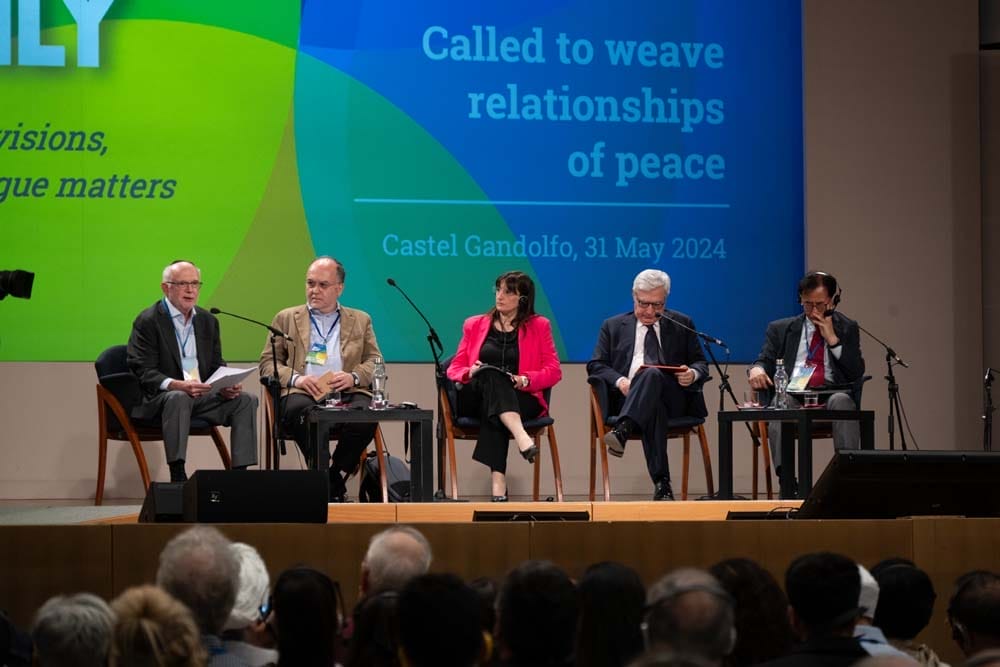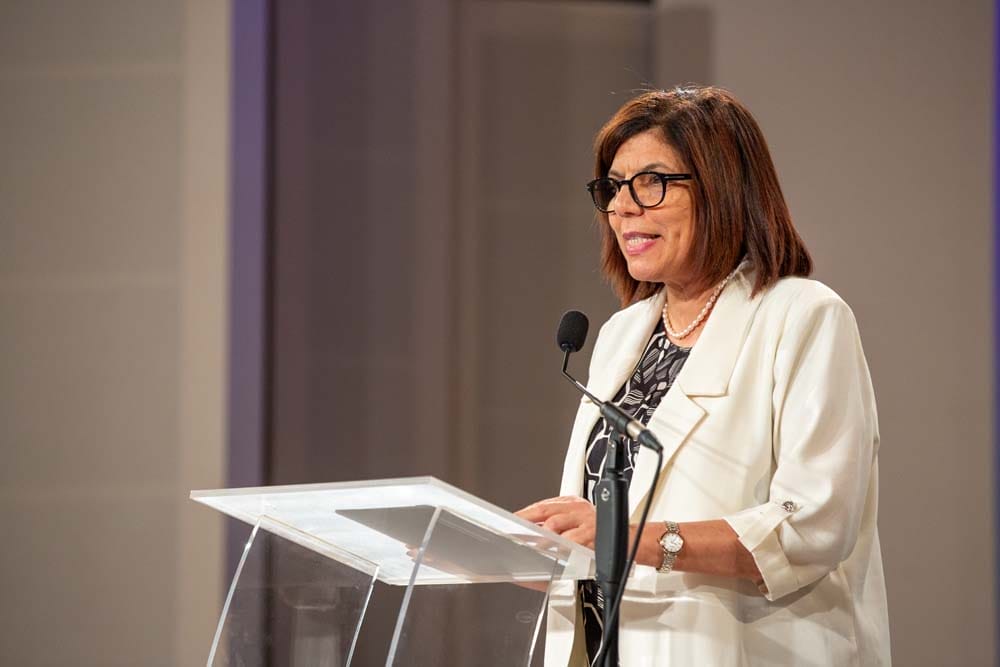The international interreligious conference “One Human Family”, promoted by the Focolare Movement, has just concluded with a pilgrimage of fraternity to Assisi. There were 480 people present from 40 countries, speaking 12 languages.
In the city of peace, the prayer for fraternity, justice and reconciliation for all peoples in conflict resounded as a solemn pact, welcomed and pronounced by the participants, each according to their own faith
Among them were rabbis, imams, Catholic priests, Theravada and Mahayana Buddhist monks, as well as Jewish, Muslim, Christian, Hindu, Buddhist, Sikh, and Baha’i lay people, and believers of traditional African religions, of all generations.
The conference was organised by an interreligious team that centred its programme on the supreme good of peace, which is extremely threatened today.
“The experience we are living is incredible, it’s an experience of family and there is the presence of the divine,” say Rita Moussallem and Antonio Salimbeni, coordinators of the Focolare Movement’s Centre for Interreligious Dialogue. “When we had the idea of this conference, we could not have imagined all that was about to happen: the conflict in the Holy Land and the flare-up of crises in other parts of the world. Yet, it is precisely today that dialogue is more necessary than ever. We talked about the steps needed to build peace, but the emphasis was above all on the actual experience that we are living and that we want to bring to the world. On the other hand, it is the tangible encounter with the other that transforms the many polarizations into relationships.”
The programme
Meeting, listening, steps of reconciliation, sharing the pain of peoples were the characteristic of this conference that alternated between panel discussions led by experts and dialogue groups among the participants. Politics and international diplomatic action, economics, artificial intelligence and the environment were the topics discussed, all in the perspective of peace. Numerous academics and experts from many cultures, religions and backgrounds addressed the conference. We will name but a few: Ambassador Pasquale Ferrara, Director General for Political and Security Affairs at the Ministry of Foreign Affairs and International Cooperation, Chief Rabbi Marc Raphaël Guedj, Muslim theologian Shahrzad Houshmand Zadeh, Dr. Kezevino Aram, President of the Indian organisation ‘Shanti Ashram’, Rev. Kosho Niwano, President-designate of the Japanese Buddhist movement Risho Kossei Kai, Mr. Fadi Shehadé, founder of the RosettaNet Project, former CEO of ICANN, the economist Luigino Bruni, Indian philosopher Prof. Priya Vaidya, Islamic theologian Adnane Mokrani, Indonesian Prof. Dicky Sofjan of the International Centre for Law and Religious Studies, Prof. Fabio Petito, Professor of Religion and International Affairs at Sussex University (UK) and many others.
Ambassador Ferrara emphasized, “Religions have a fundamental role to play today. Contrary to what the realists of international relations say, war is not the normal condition of humanity. Religions can perform the role of the ‘critical conscience’ of humanity and can address politics, pointing out what the priorities are. There is a need for political imagination; to imagine the future of this planet in a constructive, new, creative way. We need to cultivate something that is currently missing in international relations, which is trust.”
There were also many rich sessions dedicated to personal testimonies, projects, actions focused on collaboration between people and communities belonging to different religious faiths, for peace and in support of the needs of their respective peoples.
An Audience with Pope Francis
On the 3rd of June, a delegation of 200 participants was received in audience by Pope Francis, who in his speech defined the journey started by Chiara Lubich with people of different religions as: “A revolutionary journey that did much good for the Church”.“The foundation of this experience,”the Holy Father further affirmed, “is the love of God expressed through mutual love, listening, trust, hospitality and getting to know one another, all the while fully respecting each other’s identities.”
“Se da un lato queste parole ci danno profonda gioia – ha commentato “While these words give us deep joy,” commented Margaret Karram, President of the Focolare Movement, “we also feel the responsibility to do much more for peace. This is why we want to work to strengthen and spread the culture of dialogue and of “care” for people and for creation. The Pope confirmed this to us when he said that dialogue between religions is a necessary condition for world peace. In such terribly dark times like these, humanity needs a common space to make hope tangible.”
Stefania Tanesini
Foto Gallery: © CSC Audiovisivi – Caris Mendes e Carlos Mana, Vatican Media, RKK.




















0 Comments